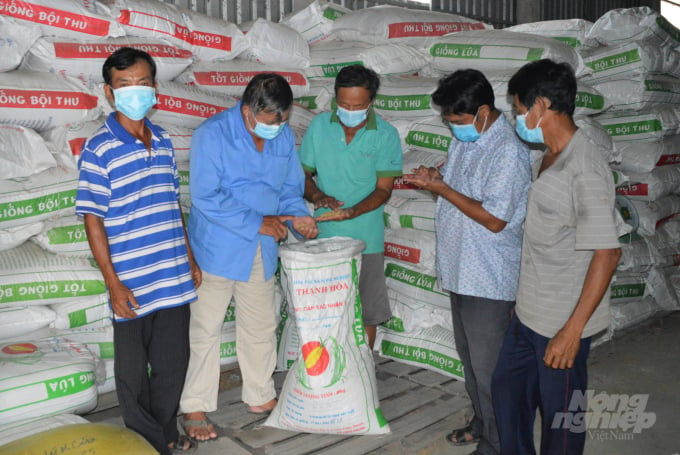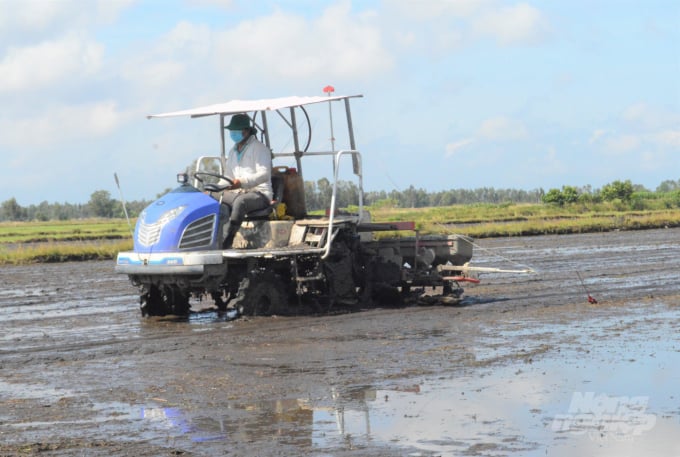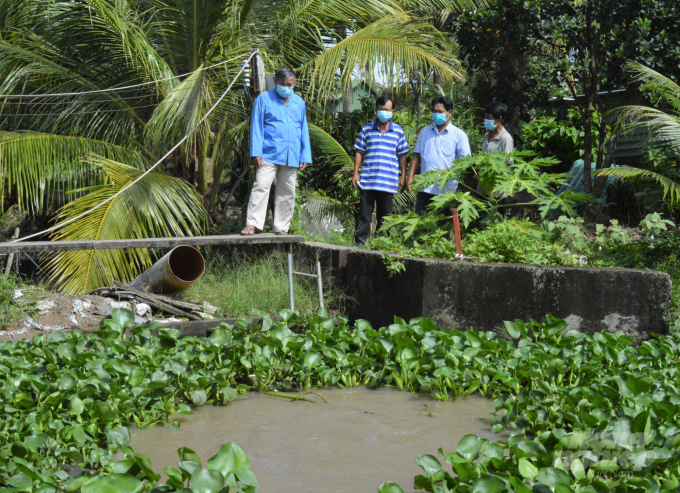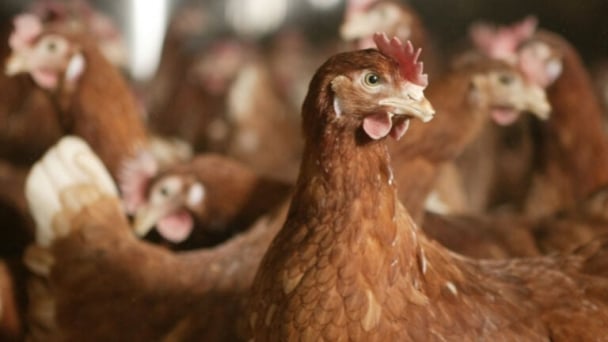June 27, 2025 | 10:45 GMT +7
June 27, 2025 | 10:45 GMT +7
Hotline: 0913.378.918
June 27, 2025 | 10:45 GMT +7
Hotline: 0913.378.918

Due to participating in the VnSAT project, farmers here have sharply reduced the amount of seed sown. Photo: Trung Chanh.
Through participating in the VnSAT project for many years, the members of Tan Long Agricultural Cooperative (Vinh Tuong commune, Vi Thuy district, Hau Giang province) have been trained in techniques and practiced techniques the "3 Decrease 3 Increase", "1 Must 5 Decrease" in rice production.
Deputy Director of Tan Long Cooperative, Mr. Nguyen Van Thich, said that the cooperative has a cultivation area of 138 hectares and an area associated with farmers of 700 hectares. In which, the area participating in the VnSAT project is 708 hectares.
The rice varieties selected for sowing are RVT, Dai Thom 8, OM18, ST24, ST25… Due to participating in the VnSAT project, farmers here have sharply reduced the amount of seed sown. On average, the amount of rice for sowing is currently only 120 kilograms per hectare, compared to more than 150 kilograms per hectare before.
"Cooperative members and households work together to make rice according to the organic process. We choose two rice varieties, ST24 and ST25, for planting. The cooperative will sign a contract to cover the entire output for rice processing.
The sowing process will reduce the amount of seed rice to only 100 kilograms per hectare for seeding, while machine transplanting or cluster seeding is at 60-80 kilograms per hectare. Reducing sowing varieties will help reduce fertilizers, pesticides, and adequate irrigation. Through that, it helps to reduce production costs, lower costs, and maintain profits in the current context of high material prices," Mr. Thich shared.

The sowing process will reduce the amount of seed rice to only 100 kilograms per hectare for seeding, while machine transplanting or cluster seeding is at 60-80 kilograms per hectare. Photo: Trung Chanh.
In the 2021-2022 winter-spring rice crop, Hau Giang province plans to plant 76,500 hectares. Currently, agricultural material prices have increased at a high level. Without technical solutions to reduce input costs, farmers will not be profitable.
The province has focused on directing and mobilizing farmers to apply solutions on reducing varieties, using fertilizers as reasonably and as economically as possible, prioritizing the replication and application of technical packages such as "3 Decrease 3 Increase", "1 Must 5 Decrease", integrated pest management (IPM).
Mr. Vo Minh Phuc, Deputy Director of VnSAT Project in Hau Giang province, said that the project was implemented in Chau Thanh A, Phung Hiep, Long My, Vi Thuy districts, Long My town, and Vi Thanh city. There are 32 participating communes, with 69,000 beneficiaries.
Up to now, the number of farmers trained and applying the "3 Decrease, 3 Increase" technique is 21,645 households/21,976 hectares; technical training "1 must 5 Decrease" is 14,278 households/14,680 hectares. The sustainable rice cultivation area with an offtake contract with an enterprise is about 6,200 hectares.
In Hau Giang province, the VnSat project aims to have at least 16 farmer organizations/cooperatives of a new type, with a minimum farming area of 500 hectares or 500 cooperative members.
Vi Thang Agricultural Cooperative (Vi Thang Commune, Vi Thuy District, Hau Giang) is the unit that benefits from infrastructure investment from the VnSAT Project. Previously, the unusual weather caused a lack of water for irrigation or flooding, which caused many difficulties for farmers' rice production. After being invested in a pumping station, farmers have taken the initiative in water for irrigation.
Similarly, Danh Tien Agricultural Cooperative (Xa Phien commune, Long My district) was also selected to be invested in infrastructure, including ditches, irrigation troughs, drying kilns, and rice storage.
Mr. Tran Hoang Nho, Director of Danh Tien Agricultural Cooperative, said that the projects have been invested and put into operation, helping farmers cultivate rice more sustainably according to the goals set by the VnSAT Project.
Rice quality is guaranteed after harvest, easy to consume and avoid traders forcing farmers to push prices every time the harvest season comes.
Up to now, the province has completed 13 construction and installation bidding packages to upgrade the infrastructure of rice production areas for farmer organizations participating in the VnSAT project, with a total value of more than VND 90 billion.

Thanh Hoa Agricultural Cooperative (Thanh Loc Commune, Chau Thanh District, Kien Giang Province) is the unit selected by the VnSAT Project to invest in infrastructure. Photo: Trung Chanh.
In addition, the province is completing nine rice drying kilns and two straw rolling machines, thereby creating favorable conditions for farmers to be proactive in production, effectively responding to adverse weather caused by climate change.
In Kien Giang province, the VnSAT project is implemented in Chau Thanh, Tan Hiep, Giong Rieng, Hon Dat, Giang Thanh, U Minh Thuong districts, and Rach Gia City. The project area is 30,813 hectares, with 16,283 participating farmers.
Farmers are trained, visited to learn from experience, and apply advanced rice farming techniques to the field. As a result, the amount of rice seed sown, nitrogen fertilizers, pesticides has decreased, yield and quality of rice increased.
Thanh Hoa Agricultural Cooperative (Thanh Loc Commune, Chau Thanh District, Kien Giang Province) is the unit selected by the VnSAT Project to invest in infrastructure, helping to save water for irrigation. It is also very convenient to transport rice from the field when harvested to the kiln and warehouse, ensuring the quality of the rice.
The VnSAT project has helped hundreds of thousands of farming households in the Mekong Delta change their traditional rice farming practices, from the goal of high investment to achieve high productivity to reducing investment costs and increasing economic efficiency.
Translated by Ha Phuc

(VAN) Research has shown that Hy-Line brown hens may be better suited for cage-free production based on overall greater egg production and other quality metrics.
![Turning wind and rain into action: [9] Digitizing hydrometeorological data in response to climate change](https://t.ex-cdn.com/nongnghiepmoitruong.vn/608w/files/news/2025/06/17/z6704423696987_15fd32ffc26d590d204d520c9dac6786-nongnghiep-165943.jpg)
(VAN) Farmers have begun accessing hydrometeorological applications to adjust their cropping schedules, aiming to ensure productivity and adapt to climate change.
![Turning wind and rain into action: [8] Real-time salinity detection and early warning technology](https://t.ex-cdn.com/nongnghiepmoitruong.vn/608w/files/news/2025/06/17/z6704423696987_15fd32ffc26d590d204d520c9dac6786-nongnghiep-151127.jpg)
(VAN) Thanks to the integration of modern hydrological-hydraulic models, remote sensing technologies, and artificial intelligence, the accuracy of hydrological forecasting has significantly improved.
![Turning wind and rain into action: [7] Early disaster warnings help marine farmers minimize losses](https://t.ex-cdn.com/nongnghiepmoitruong.vn/608w/files/news/2025/06/17/z6704423696987_15fd32ffc26d590d204d520c9dac6786-nongnghiep-142942.jpg)
(VAN) In recent years, thanks to early disaster warnings and forecasting, marine farmers in Khanh Hoa province have been able to reduce risks and losses, thereby improving production efficiency.
![Turning wind and rain into action: [6] ‘Four on-the-spot’ disaster management software](https://t.ex-cdn.com/nongnghiepmoitruong.vn/608w/files/news/2025/06/17/e5a48259d6a262fc3bb3-nongnghiep-183800.jpg)
(VAN) By simply activating the scenario on the disaster management software, the relevant authorities immediately know how many households need to be evacuated, where to evacuate them to, and by what means of transportation…
![Turning wind and rain into action: [5] Hue applies modern technology in disaster forecasting](https://t.ex-cdn.com/nongnghiepmoitruong.vn/608w/files/news/2025/06/17/z6704423696987_15fd32ffc26d590d204d520c9dac6786-nongnghiep-093938.jpg)
(VAN) In Hue city, modern technology has recently been applied in meteorological and hydrological forecasting and warning, helping to reduce the damage caused by natural disasters.

(VAN) A cutting-edge farming technique being implemented on an experimental ranch in Arizona's Sonoran Desert has already saved a billion gallons of water over five years, according to Civil Eats.